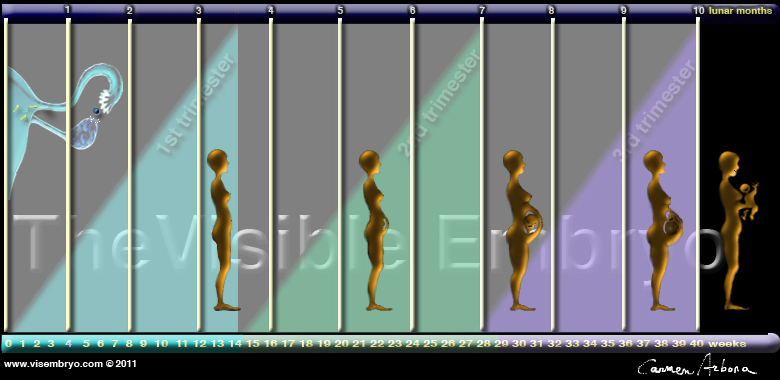|
|
Developmental Biology - Fetal Brain Development
Mom's Stress During Pregnancy Affects Fetal Brain
A mother's mental health alters the structure and biochemistry of her infant's developing brain...
Pregnant women experience elevated anxiety and depression to different degrees, but their stress affects the structure of a developing fetal brain, disrupting its biochemistry.
This is true even in moms with uncomplicated pregnancies, plus high socioeconomic status based on their income and secure working conditions. These results are from research conducted at Children's National Hospital in Washington DC and published January 29, 2020, in JAMA the Journal of the American Medical Association.
In a previous study, 65% of pregnant women diagnosed with a fetus having congenital heart disease, reflected high stress levels due to the diagnosis. This high number is concerning, but not surprising given a pregnant mother might rightfully worry about outcomes of her baby's diagnosis.
"In the latest study, we ran the same panel of questions and were surprised to find a high proportion of otherwise healthy pregnant women whose unborn babies are doing well also report high levels of stress."
Catherine Limperopoulos PhD, Director, Center for the Developing Brain at Children's National Hospital, and senior author of the research.
Anxiety and depression are the most common mental health problems of pregnancy. To learn more about implications of both on developing fetal brains, the Children's National Hospital research team recruited 119 healthy volunteers with low-risk pregnancies from obstetric clinics in the Washington DC area.
The women had a mean age of 34.4 years, were all high school graduates, 83% of whom were also college graduates, 84% reported professional employment and were followed from January 1, 2016, to April 17, 2019 in a study of "maternal behavior on fetal development".
Magnetic Resonance Imaging (MRI) was then conducted in utero on 193 fetal brains between 24-40 weeks gestation. The MRIs measured fetal brain volume as well as cortical gray matter, white matter, deep gray matter, cerebellum, brainstem and hippocampus volumes.
On the same day as these MRI visits, pregnant mothers completed questionnaires measuring their own stress, anxiety and depression. Additional questions included "How do you feel right now?," "How do you generally feel?" and each mom's degree of stressful feelings experienced the month prior to that MRI visit.
Results for high status moms indicate:
27% of the moms' tested positive for stress
26% of the moms' tested positive for anxiety
11% of the moms' tested positive for depression
High maternal anxiety/stress are associated with:
Increased fetal cortical gyrification - the characteristic folds in our cerebral cortex.
Decreased creatine and choline in the fetal brain.
Although maternal stress scores decreased with baby's advancing gestational age mom's expressed anxiety and depression did not.
This is the first time maternal psychological distress has been associated with increased fetal gyrification in fetal frontal and temporal lobes.
The scientists also found an association between left fetal hippocampal volume and maternal psychological distress, reports Yao Wu PhD, lead author of the research. Also, mom's stress was associated with stunting left hippocampal volume growth more than right hippocampal volume growth. And, capturing elevated maternal depression is associated with decreased creatine and choline levels in the fetal brain.
Late in pregnancy - at the time these women were recruited into the cohort study - the fetal brain grows exponentially with key metabolite levels also rising.
Creatine helps in the recycling of adenosine triphosphate, the cell's energy currency. Typically, high levels of this metabolite indicates rapid change and increased maturation of the cell; creatine also is known to support cognitive function. Choline levels also typically rise, marking cell membrane turnover as new cells are generated and support memory, mental focus and concentration.
The Children's National Hospital research findings "have enormous scientific, clinical and public health implications," Charles A. Nelson III, Ph.D., Boston Children's Hospital, writes in a companion editorial.
"These women were healthy and of high socioeconomic status and educational level, leading us to conclude that the prevalence of prenatal maternal psychological distress may be under-estimated.
While stress is an everyday reality for most of us, this is different as elevated stress in pregnancy can alter fetal brain programming. Our findings underscore the critical need to universally screen all pregnant women for prenatal psychological distress, even young mothers whose pregnancies would not otherwise raise red flags."
Catherine Limperopoulos PhD, Director, MRI Research of the Developing Brain, Diagnostic Imaging and Radiology/Fetal and Transitional Medicine, The George Washington University School of Medicine.
Abstract
Importance
Prenatal maternal stress is increasingly associated with adverse outcomes in pregnant women and their offspring. However, the association between maternal stress and human fetal brain growth and metabolism is unknown.
Objective
To identify the association between prenatal maternal psychological distress and fetal brain growth, cortical maturation, and biochemical development using advanced 3-dimensional volumetric magnetic resonance imaging (MRI) and proton magnetic resonance spectroscopy (1H-MRS).
Design, Setting, and Participants
This cohort study prospectively recruited pregnant women from low-risk obstetric clinics in Washington, DC, from January 1, 2016, to April 17, 2019. Participants were healthy volunteers with a normal prenatal medical history, no chronic or pregnancy-induced physical or mental illnesses, and normal results on fetal ultrasonography and biometry studies. Fetal brain MRI studies were performed at 2 time points between 24 and 40 weeks gestation.
Exposures
Prenatal maternal stress, anxiety, and depression.
Main Outcomes and Measures
Volumes of fetal total brain, cortical gray matter, white matter, deep gray matter, cerebellum, brainstem, and hippocampus were measured from 3-dimensional reconstructed T2-weighted MRI scans. Cortical folding measurements included local gyrification index, sulcal depth, and curvedness. Fetal brain N-acetylaspartate, creatine, and choline levels were quantified using 1H-MRS. Maternal stress, depression, and anxiety were measured with the Perceived Stress Scale (PSS), Edinburgh Postnatal Depression Scale (EPDS), Spielberger State Anxiety Inventory (SSAI), and Spielberger Trait Anxiety Inventory (STAI).
Results
A total of 193 MRI studies were performed in 119 pregnant women (67 [56%] carrying male fetuses and 52 [44%], female fetuses; maternal mean [SD] age, 34.46 [5.95] years) between 24 and 40 gestational weeks. All women were high school graduates, 99 (83%) were college graduates, and 100 (84%) reported professional employment. Thirty-two women (27%) had positive scores for stress, 31 (26%) for anxiety, and 13 (11%) for depression. Maternal trait anxiety was associated with smaller fetal left hippocampal volume (STAI score: 0.002 cm3; 95% CI, 0.003 to 0.0008 cm3; P = .004). Maternal anxiety and stress were associated with increased fetal cortical gyrification in the frontal lobe (? for SSAI score: 0.004 [95% CI, 0.001-0.006; P = .002]; ? for STAI score: 0.004 [95% CI, 0.002-0.006; P < .001]; ? for PSS score: 0.005 [95% CI, 0.001-0.008; P = .005]) and temporal lobe (? for SSAI score: 0.004 [95% CI, 0.001-0.007; P = .004]; ? for STAI score: 0.004 [95% CI, 0.0008-0.006; P = .01]). Elevated maternal depression was associated with decreased creatine (EPDS score: 0.04; 95% CI, 0.06 to 0.02; P = .005) and choline (EPDS score: 0.03; 95% CI, 0.05 to 0.01; P = .02) levels in the fetal brain.
Conclusions and Relevance
This study found that the prevalence of maternal psychological distress in healthy, well-educated, and employed pregnant women was high, underappreciated, and associated with impaired fetal brain biochemistry and hippocampal growth as well as accelerated cortical folding. These findings appear to support the need for routine mental health surveillance for all pregnant women and targeted interventions in women with elevated psychological distress.
Authors
Yao Wu PhD; Yuan-Chiao Lu PhD; Marni Jacobs PhD; Subechhya Pradhan PhD; Kushal Kapse MS; Li Zhao PhD; Nickie Niforatos-Andescavage MD; Gilbert Vezina MD; Adré J. du Plessis MB ChB; Catherine Limperopoulos PhD.
Acknowledgments
In addition to Drs. Limperopoulos and Wu, Children's National study co-authors include Yuan-Chiao Lu, Ph.D., research associate; Marni Jacobs, Ph.D., biostatistician; Subechhya Pradhan, Ph.D., research faculty; Kushal Kapse, MS, staff engineer; Li Zhao, Ph.D., research faculty; Nickie Niforatos-Andescavage, M.D., neonatologist; Gilbert Vezina, M.D., director of the neuroradiology program; and Adré J. du Plessis, M.B.Ch.B., director, Fetal Medicine Institute. Research coordinators Catherine Lopez, MS, Kathryn Lee Bannantine, BSN, and Jessica Lynn Quistorff, MPH, assisted with subject recruitment.
Financial support for the research described in this post was provided by the National Institutes of Health under grant No. RO1 HL116585-01 and the Thrasher Research Fund under Early Career award No. 14764.
Return to top of page.
| |
|
Feb 7 2020 Fetal Timeline Maternal Timeline News
 A new study finds psychological distress in healthy, well educated, employed pregnant women is high, unappreciated, and important as mom's stress affects the developing fetal brain. The researchers propose a need for routine mental health surveillance in women while pregnant.
IMAGE CREDIT Parenting.
|



